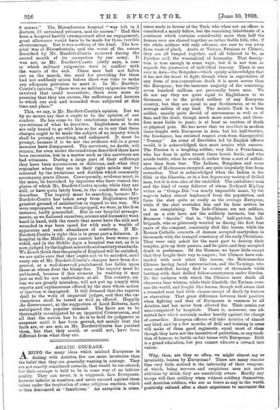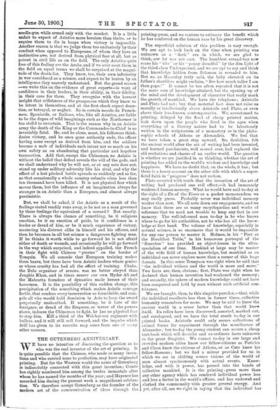ASIATIC COURAGE. A MONG the many ideas which mislead Europeans in
dealing with Asiatics, few are nore inveterate than the belief that they are generally wanting in courage. They are not exactly considered cowards, that would be too absurd, but their courage is held to be in some way of an inferior quality. They can never, it is supposed, face Europeans, however inferior in numbers, and never succeed against them unless under the inspiration of some religious emotion, which is then denounced as "fanaticism." An exception is some. times made in favour of the Turk, who when not an officer is considered a manly fellow, but the remaining inhabitants of a continent which contains considerably more than half the human race are classed together as rather feeble folk, who, if the white soldiers will only advance, are sure to run away from want of pluck. Arabs or Tartars, Persians or Chinese, they are all lumped together, and all believed to be, as Pyrrhus said, the womankind of humanity. That descrip- tion is true enough. in some ways; but it is not true as regards the possession of individual bravery. There is one race in Asia—the Bengalee—which openly acknowledges that it has not the heart to fight, though when in expectation of any form of non-contentious death it is more, serene than the European; but the immense majority of the remaining seven hundred millions are personally brave men. We do not say they are quite equal to Englishmen or to Germans, or to the picked soldiers of any European country, but they are equal to any Southerners, or to the average militia of any land. The Asiatic Turk is a born soldier, usually quite devoid of nervousness as well as of fear, and the Arab, though much more sensitive, and' there- fore more liable to panic, is at least as careless of death or physical pain. He has never that we recollect in modern times fought with Europeans in Asia, but his half-brother, the Soudanese, has extorted respect even from disrespectful "Tommy." An army of Dervishes led by English officers would, it is acknowledged, face most armies with success. The Persian is a laughing soldier, very like a Frenchman, who has done in quite recent times heroic deeds, and who avoids battle, when he avoids it, rather from a sort of selfish- ness than from fear. The Indians, Bengalees and some classes of Madrassees excepted, are quite singularly free from cowardice. That is acknowledged when the Indian is the Sikh or the Ghoorka, or in a less degree any variety of drilled man, but it is true also of the um:frilled- The ambulance man and the land of camp follower of whom Rudyard Kipling writes as " Gunga Din "—a nearly impossible name, by the way—is taken almost haphazard from the population, and faces the shot quite as coolly as the average European, while if the shot overtakes him and his hour arrives he is less complaining. The Indo-Chinese are not soldiers, and as a rule have not the soldierly instincts, but the Burmese " dacoits," that is, " klephts," half-patriots, half. brigands, who so grievously worried us during the first four years of the conquest, constantly died like heroes, while the Roman Catholic converts of A ',ram accepted martyrdom in thousands with the tranquil constancy of the early Christians They were only asked for the most part to destroy their temples, give up their pastors, and be quiet, and they accepted death in preference. Of the Siamese we know little except that they fought their way to empire; but Chinese have con- tended with each other like heroes, the Mahommedan Chinese having faced extermination, and the Taepings, who were undrilled, having died in scores of thousands while battling with their drilled fellow-countrymen under Gordon. To the coolness with which the Chinese meet death all observers bear witness, while their kinsfolk, the Tartars, over- ran the world, and fought like heroes, though well aware that a wounded man had little chance except of death by torture or starvation. That great difference between their position when fighting and that of Europeans is common to all Asiatics, and has never been allowed for. Their armies are unaccompanied by hospitals. There is, moreover, one ad- mitted fact which certainly makes heavily against the charge of cowardice. European officers will take Asiatics of almost any kind, and by a few months of drill and training in arms will make of them good regiments, equal most of them though they have not the incentive of patriotism, or any tradi- tion of honour, to battle on fair terms with Europeans. Drill is a grand education, but you cannot educate a coward into valour.
Why, then, are they so often, we might almost say so invariably, beaten by Europeam ? There are many reasons One very little noticed is the inferiority of their weapons, of which, being nervous and suspicious men not made oblivious by drink, they are sensitively aware. Hardly any troops will face artillery when without artillery themselves, and Austrian soldiers, who are as bra.ve as any in the world, positively refused after a short experience to encounter the
needle-gun while armed only with the musket. It is a little unfair to expect of Asiatics more heroism than theirs, or to require them to die in heaps when victory is impossible. Another reason is that we judge them too exclusively by their conduct when opposed to Europeans, of whom they have an instinctive awe, not derived from physical fear at all, but as patent in civil life as on the field. The only Asiatics quite free of this feeling are the Arabs, and if we ever meet them in the field on equal terms we shall be surprised at the magni- tude of the death-list. They know, too, their own inferiority in war considered as a science, and expect to be beaten by an intelligence they scarcely understand. But the grand reason —we write this on the evidence of great experts—is want of confidence in their leaders, in their, ability, in their fidelity, in their care for them. They recognise with the keenest insight that selfishness of the prosperous which they know to be latent in themselves, and at the first check expect deser- tion, or betrayal, or neglect. So in certain moods do French- men, Sps tiiards, or Italians, who, like all Asiatics, are liable to be the dupes of wild imaginings such as the Northerner is too stolid to entertain. That is the reason why in an Asiatic army the death of the King or the Commander-in-Chief is so invariably fatal. He, and he alone, must, his followers think, desire victory, and he once gone authority ends, the officer having none except as derived from him, and the soldiers become a mob of individuals each intent not so much on his own' safety as on abandoning that particular and hopeless transaction. Add that, except the Chinaman, no Asiatic is without the belief that defeat reveals the will of the gods, and we shall understand why he will not, or at any rate does not,
• stand up under military adversity like his rival, and why the effect of a lost pitched battle spreads so suddenly and so far, so that occasionally a whole country submits when less than ten thousand have been killed. It is not physical fear which moves them, but the influence of an imagination always far stronger in an Asiatic than a European, and almost always pessimistic.
But, we shall be asked, if the Asiatic as a result of the feelings stated readily runs away, is he not as a man governed by those feelings the equivalent of a coward ? Not exactly. There is always the chance 0 something, be it religious emotion, be it an emotion of pride, be it confidence in a leader or dread of him, or be it much experience of victory, mastering his distrust alike in himself and his officers, and then he becomes in all but science a dangerous fighting man. If he thinks it worth while to go forward he is not afraid either of death or wounds, and occasionally he will go forward in the way which surprised, and indeed appalled, the French in their fight with Chinese " pirates " on the border of Tonquin. We all concede that European training makes them brave, but there have been Asiatic leaders whose genius or whose cruelty has bad all the effect of training. Chaka, the Zulu organiser of armies, was no better obeyed than Jenghiz Khan, and in times nearer our own nyder All and the Mahratta founders of dynasties made heroes of their horsemen. It is the possibility of this sudden change, this precipitation of the something which makes Asiatic courage feeble, that renders every insurrection so formidable, and com- pels all who would hold dominion in Asia to keep the sword perpetually unsheathed. If something. be it hate of the foreigner, or dread of the Empress, or terror of the powers above, induces the Chinaman to fight, he has no physical fear to stop him. Kill a third of the Wei-hai-wei regiment with bullets, and it will still roll forward, and the impulse which drill has given to its recruits may come from one of many other sources.



















































 Previous page
Previous page